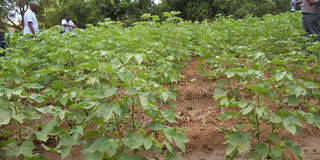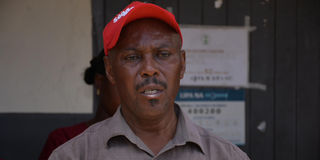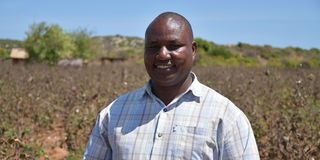How new variety is reviving love for cotton farming in Lamu

Farmers from Lake Kenyatta farmers’ Cooperative Society Ltd have planted genetically modified cotton on their farms.
On a normal day at Wetemere village in Mpeketoni, Lamu County, where women are famed for riding motorcycles, a new love for cotton has arisen. In farms, it is now a common sight to find both men and women bent, with sisal bags on their backs, oblivious of the hot sun, harvesting cotton.
For the second year now, farmers from Lake Kenyatta farmers’ Cooperative Society Ltd have gathered their tools and hope, and planted genetically modified cotton on their farms. The Bt cotton, they testify, has brought a new lease of life, especially since farmers had given up on farming the normal variety.
Christopher Ngui, a retired teacher who is currently the biggest Bt cotton farmer in Lamu, explains that he has farmed cotton for 45 years now, having stumbled onto it as a side business to earn extra income.
Then, the land was virgin, and fertile, and nourished the Heart89M cotton variety that brought him enough money. At the start of his farming career, he drilled a borehole, relying on it in dry seasons to irrigate his plants.
For years, the crop did well, and the income enabled him to buy his ageing mother the beautiful things she wanted, and to take his children to school, up until the crops started needing a lot of pesticides.
“By 1990s, we often sprayed the crop to protect it from bollworms. Between 2006 and 2009, farmers started giving up on farming cotton. By 2012, most had totally given up on cotton farming, and I thought cotton farming had totally come to an end," he says.
"Then, I was the chairperson of Lake Kenyatta Farmers’ Cooperative Society Ltd, and we stayed like people with no hope, until 2021 when everything changed. We started receiving seeds from the Lamu County Government and national government. That was doing well. we would later realise that they were genetically modified,” narrates Ngui.
“I know there are concerns and controversy surrounding genetically modified crops, but these seeds have brought us joy. When we received the seeds for the first time, some people did not get them and therefore did not plant them. The second year, they planted and we even registered ourselves, even though most were scared to register. This year, they are running to me for registration,” he explains, attributing it to the good yields from the crop.

Christopher Ngui, a retired teacher who is currently the biggest Bt cotton farmer in Lamu.
“One ball of cotton is 0.5 grams, and from the normal cotton plant that we were farming before, each plant would produce about 20 balls. The Bt cotton produces more than 70, even up to 100. The Bt cotton has pushed our yields from less than a half million shillings to two million shillings. This crop also, doesn’t require a lot of pesticide, and is able to withstand drought. We only spray pesticides three times in a season, which is good because we do not to expose our farmers to harmful chemicals. We have supplied Makueni, Meru, Kitui and Thika Clothes Mill with cotton,” he explains.
He adds that during the last season, he harvested more than 23 tonnes of cotton from 22 acres.
Lucy Njeri Kimani who serves as secretary of Lake Kenyatta Farmers’ Cooperative Society, also testifies that she is harvesting cotton from her four-and-a-half-acre farm for the second time this season.
“When I planted, I only sprayed the crop three times. This is different because I would spray the normal variety every two weeks. In the second season, I only sprayed twice,” she says.
Julius Macharia, the current chairperson of Lake Kenyatta Cooperative Society, explains that besides bollworm infestation, low price of normal cotton variety also contributed to its downfall.
“Cotton planting in Lamu started between 1975 and 1978. The crop was doing well, until it got infested by bollworms. It also required a lot of pesticide and its price went down to Sh8 per kilogramme. The yields had also gone down, an acre would give you 300 kilogrammes. A farmer was losing about Sh45 per kilo. With the new Bt cotton, you get about 1.4 tonnes of produce from an acre,” he states
“We have farmed it for two years now. The price is now standard because it is being regulated by the government. We now sell a kilogramme for Sh52, and the farmer is paid his money upon weighing his produce. You can harvest three times from a single planting season. The main challenge we have now is availability of seed,” he adds.
He also explained that the delay of seeds, coupled with arrival of rains may force some farmers to abandon cotton farming for the season to plant crops whose seeds are readily available.
Macharia also complained that even though the government has subsidised fertiliser, it is expensive and hard to find at a National Cereals and Produce Board warehouse that is more than 45 kilometres away. Farmers spend about Sh1,200 on transport, only to collect one bag of fertiliser.
“If possible, we would like the fertiliser to be brought to our society offices because we have the storage space, and to save our farmers from incurring unnecessary additional costs. We will provide storage and security. We have over 6,000 farmers who have been registered with us, and we deliver the fertilisers to them free of charge.”

Peter Kingoo, Manager of Makueni Ginneries, that processes cotton from Mpeketoni at Wetemere village, on a farm owned by Lake Kenyatta Farmers Cooperative Society.
He also noted that should a ginnery be built near the society offices, the farmer would benefit more, since the society collects cotton produce, stores them then transports in bulk to cotton ginneries for processing.
“Cotton costs the farmer Sh9 per kilogramme to transport cotton lint to ginneries. Should the ginnery be constructed near the warehouse, the farmer will save that money, and the ginneries will bring jobs to the youth.”
Mahyco Private Ltd, the company that provides the Bt cotton seeds explained that 30 tonnes of seeds are already available in their Nairobi warehouse, awaiting distribution at the end of the month. In 2022, Lamu farmers received 4.5 tonnes of Bt cotton seeds, but target more than 10 tonnes this year. Only registered farmers are eligible to receive the seed.
Initially, the seeds used to be imported from India, and would delay sometimes. But this year, there are enough. The 30 tonnes are enough because an acre only requires one and a half kilogrammes of seed,” said Leonard Ireri, Mahyco Extension Officer in Lamu County. To solve this, he explains that local production of Bt cotton seeds should be done. This requires emasculation of the seed to ensure quality.
“Farmers will have to be trained to ensure that there is no self-pollination. We have already begun training Bt cotton farmers from Baringo, Embu and Kirinyaga counties about how to obtain quality and certified seeds that can be replanted. In the next two to three years, there will be locally made seeds to beat the pricing component and delays occasioned by imports,” added Ireri.
Amidst the GMO debate, Ireri also debunked the popular claim that genetically modified seeds of any crop cannot be replanted. The seeds, he said can germinate when replanted, however, the yield is likely to be low because of reduced vigour of the seed, which deteriorates with every replant.
Peter Kingoo, manager of Makueni Ginneries Ltd, explains that the high yield has also benefited his ginnery, which takes in cotton from Lamu, and competes with Kitui Ginneries Ltd, Meru Ginnery Limited and Thika Clothes Mill.
The ginnery, which has been operational for 23 years, has the capacity to process six million kilogrammes of seed cotton.
“Apart from 2011, when we realised about 30 per cent of our installed capacity, we have been operating below 20 per cent. For the last three years, when the government allowed planting of Bt Cotton, we have seen a wide improvement. In 2022, we bought about 870,000 kilogrammes of seed cotton from Mpeketoni, as compared to 300,000 kilogrammes in a year when planting the normal variety,” Kingoo said.
“The yield is high because the seed is certified, strong. The biggest problem with the initial seed was attak by bollworms, which suck the sap from the cotton plant, killing it, and reducing production. But the BT cotton is resistant to pests, and does well,” he explained.
“Because BT cotton also doesn’t require a lot of spraying to protect it from pesticide, it has reduced the cost of production from eight sprays to three. The farmer’s income is, therefore, less spent. Because the bollworms are not destroying the cotton balls or cotton seeds, the production per unit area has also increased,” he adds.
Reiterating the importance of receiving seed early, he explained that it’s important for cotton seeds to receive the first rain. Failure to results in loss of more than a third of crop yield.
In Kenya, commercial farming of Bt cotton was approved by the Cabinet to begin in March 2020, following successful trials. The move was also motivated by the need to boost the manufacturing sector to set the country as a regional leader in production of textiles.





